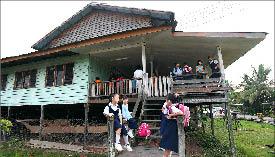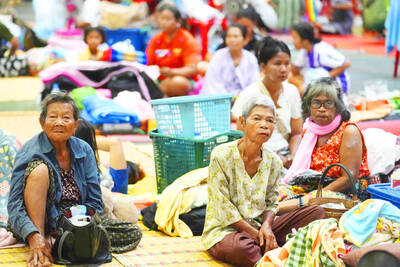Tribal chief Danny Ibang lived most of his life in the pristine jungles of the Malaysian portion of Borneo island until he was pushed into a modern world he was told would be better.
And in many ways, it is.
His Kenyah community of 2,000 enjoys electricity, running water, health and educational facilities previously undreamed of since being moved out of the jungles to a new village to make way for the huge Bakun hydroelectric dam.

Photo: AFP
However, as expanding dams, oil-palm plantations and other development forces thousands off ancestral lands in the state of Sarawak, a host of modern new problems threaten to break down once tight-knit tribal communities.
Village elders and activists say alcoholism, drug use and crime are on the increase and anger is rising over continuing encroachment on native lands.
“There have been a lot of social changes after the Bakun dam,” said Ibang, 66, whose people were among the first moved to the relocation village of Sungai Asap 14 years ago.
“Some teens who go to school learn to rebel against their parents and boys and girls now mingle freely as they see it on the television,” he said.
There were 10 recent teen pregnancies — something unheard of in the old days.
The state government is pushing to develop the economy of Sarawak, which is blessed by rich natural resources yet remains one of Malaysia’s poorest states.
However, critics say the effort, while necessary, is plagued by graft and harms tribes that are ethnically distinct from the nation’s majority Malays.
Tribal lands make up about 80 percent of Sarawak and “nearly all has been taken for logging and plantations,” said Mark Bujang, head of Borneo Resources Institute, a body working in defense of native land rights.
Last month, Penan tribespeople blocked roads into their lands for a week to protest logging and alleged river pollution by Malaysian firm Interhill until the blockade was dismantled by authorities.
At a forum on native concerns in the town of Bintulu last month organized by the Human Rights Commission of Malaysia, about 150 Iban tribespeople alleged a palm oil company illegally seized their land for a plantation and disturbed ancestral graves, said Joseph Laja, an Iban.
“We are really angry,” Laja told commission members. “If they move into another part of our land, there could be violence.”
About 4 million of Malaysia’s 28 million people belong to indigenous tribes, most of which are native to Malaysian Borneo where some retain diminishing traditional rainforest hunting and farming ways.
Officially, they enjoy the same preferential treatment in business, education and other areas accorded to Malays — a controversial policy meant to lift Malay socioeconomic standing.
However, natives and activists say this has meant little to tribes, who remain among the country’s poorest groups.
As a result, many youths welcome their new life and opportunities in Sungai Asap, which now has 11,600 people from a range of tribes living in traditionally inspired longhouses.
Roads linking the village to coastal cities have, along with modern telecommunications, opened new employment vistas for tribal youths.
“I love living in Sungai Asap,” said Lenny Prescially, 18, as she tapped out messages to friends on Facebook in a local community center. “Only the elders want to continue the old lifestyle. They don’t know anything.”
The Bakun dam has been widely criticized as a white elephant, disastrous for uprooted tribes and pristine jungles that are now inundated by a reservoir the size of Singapore, its projected power output exceeding Sarawak’s needs.
Transparency International has called the dam, which began generating electricity in August, a “monument to graft.”
There is a palpable sense of rootlessness today for communities whose identity was long linked to ancestral lands passed down through generations.
“When our land is taken away, there is no longer any blood in our body,” said Sungai Asap resident Stem Liau, 48.
Ibang, the Kenyah headman, said his people were promised 8 hectares of farmland per family at Sungai Asap, but only received a little more than 1 hectare of poor-quality land.
Hasmy Agam, chairman of the rights commission, said it had received nearly 2,000 complaints over native land rights infringement in Malaysia over the past decade. Many of those complaining have threatened violence.
“We sense that. We hope that is not the solution,” Hasmy said.

FOREST SITE: A rescue helicopter spotted the burning fuselage of the plane in a forested area, with rescue personnel saying they saw no evidence of survivors A passenger plane carrying nearly 50 people crashed yesterday in a remote spot in Russia’s far eastern region of Amur, with no immediate signs of survivors, authorities said. The aircraft, a twin-propeller Antonov-24 operated by Angara Airlines, was headed to the town of Tynda from the city of Blagoveshchensk when it disappeared from radar at about 1pm. A rescue helicopter later spotted the burning fuselage of the plane on a forested mountain slope about 16km from Tynda. Videos published by Russian investigators showed what appeared to be columns of smoke billowing from the wreckage of the plane in a dense, forested area. Rescuers in

‘ARBITRARY’ CASE: Former DR Congo president Joseph Kabila has maintained his innocence and called the country’s courts an instrument of oppression Former Democratic Republic of the Congo (DR Congo) president Joseph Kabila went on trial in absentia on Friday on charges including treason over alleged support for Rwanda-backed militants, an AFP reporter at the court said. Kabila, who has lived outside the DR Congo for two years, stands accused at a military court of plotting to overthrow the government of Congolese President Felix Tshisekedi — a charge that could yield a death sentence. He also faces charges including homicide, torture and rape linked to the anti-government force M23, the charge sheet said. Other charges include “taking part in an insurrection movement,” “crime against the

POINTING FINGERS: The two countries have accused each other of firing first, with Bangkok accusing Phnom Penh of targeting civilian infrastructure, including a hospital Thai acting Prime Minister Phumtham Wechayachai yesterday warned that cross-border clashes with Cambodia that have uprooted more than 130,000 people “could develop into war,” as the countries traded deadly strikes for a second day. A long-running border dispute erupted into intense fighting with jets, artillery, tanks and ground troops on Thursday, and the UN Security Council was set to hold an emergency meeting on the crisis yesterday. A steady thump of artillery strikes could be heard from the Cambodian side of the border, where the province of Oddar Meanchey reported that one civilian — a 70-year-old man — had been killed and

Philippine President Ferdinand Marcos Jr is to meet US President Donald Trump this week, hoping Manila’s status as a key Asian ally would secure a more favorable trade deal before the deadline on Friday next week. Marcos would be the first Southeast Asian leader to meet Trump in his second term. Trump has already struck trade deals with two of Manila’s regional partners, Vietnam and Indonesia, driving tough bargains in trade talks even with close allies that Washington needs to keep onside in its strategic rivalry with China. “I expect our discussions to focus on security and defense, of course, but also